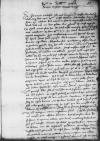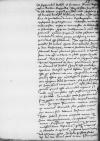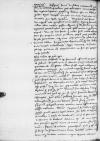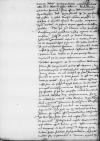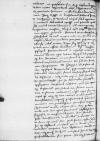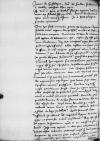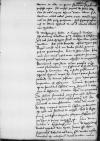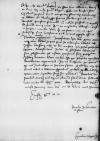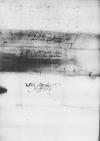Ex ⌊Germania⌋ reversus, ubi apud ⌊lantgravium Hassiae⌋ nonnullosque alios, atque adeo apud reverendissimum et
ill(ustrem) or ill(ustrissimum)⌈ill(ustrem)ill(ustrem) or ill(ustrissimum)⌉
⌊electorem Coloniensem⌋, bonum illum senem, qui celebrem de te memoriam fecit, ad aliquot haesi orig. hesi⌈haesihaesi orig. hesi⌉ menses, inveni ⌊⌋ tuas non adeo pridem illuc perlatas de mense Augusto. In ⌊⌋ mentio facta fuit de tribus vasis cerevisiae Gedanensis, quae una mittebantur ex dono Reverendissimae Dominationis Vestrae, in ⌊⌋ de cornibus et ungulis onagrorum, quae manserant in manibus ⌊Ioannis Ernesti de Esens⌋, donec sciret, quorsum illas mitteret. Ad quas ut breviter respondeam, pergratum fuit intelligere, quod adhuc salvus et incolumis ageres, estque hoc nomine tributum (ita tu vocas) optabile. Quod ad cornua et ungulas attinet, scripsi confestim ad
ill(ustrem) or ill(ustrissimum)⌈ill(ustrem)ill(ustrem) or ill(ustrissimum)⌉
⌊dominum de Grandvella⌋, ut certiorem me redderet, quorsum huiusmodi missa esse vellet. ⌊Is⌋ autem non multo post rescripsit optare, ut dentur in manus ⌊Ioannis de Borgoingne⌋, tempore nostro metatoris hospitiorum ⌊caesaris⌋ et usurarii insignis, qui et nunc eandem orig. eamdem⌈eandemeandem orig. eamdem⌉ palaestram orig. palestram⌈palaestrampalaestram orig. palestram⌉ strenue exercet ⌊ms. Andtwerpiae reg. Antverpiae⌈Andtwerpiaems. Andtwerpiae reg. Antverpiae⌉⌋. Quod et factum curavi. Addidit idem ill(ustris) or ill(ustrissimus)⌈ill(ustris)ill(ustris) or ill(ustrissimus)⌉ ⌊Grantvellanus⌋ ⌊⌋ ad ⌊⌋, quas una cum iis ad Dominationem Vestram Reverendissimam mitto.
Cervisia autem commode venerat ⌊Brugas⌋, quo tempore ⌊regina Maria⌋ ibi diversabatur. ⌊Quae⌋ et ipsa de eadem bibit, et bibendam propinavit ⌊uxori⌋ ⌊principis de Chimay⌋ origine Gallae, sorori ⌊reginae Scotorum⌋, quae cerevisiam numquam orig. nunquam⌈numquamnumquam orig. nunquam⌉ prius biberat. Addidit autem ⌊eadem regina⌋ hoc esse vinum Danicum, quo eulogio mota p(raefa)ta or praefata⌈p(raefa)ta or p(raedic)ta⌈p(raefa)tap(raefa)ta or p(raedic)ta⌉p(raefa)ta or praefata⌉ ⌊princeps⌋ bibit, sed cum nausea, ut ad insuetum potum. Sit autem illis insuetus, at nostris palatis gratissimus est. Arbitrantur etiam plerique inesse illi vim medicam laxativam et stomachalem, idque ex asara baccara aut ex lauri bacchis, quas infundi putans, quo modo profuit ⌊uxori⌋ meae in tussi, qua iam menses aliquot laborat ex infrigidatione, itaque de ea summ ms. n(!)
⌈mm ms. n(!)
⌉as habeo gratias.
Ut autem contextum rerum nostratium scias: ⌊caesar⌋ sub ultimum mensis Iulii absolvit ⌊conventum Ratisbonensem⌋ bona de se fama et opinione relicta apud bonos contenditque in ⌊Italiam⌋, quo cum orig. quum⌈cumcum orig. quum⌉ venisset, nuntiata orig. nunciata⌈nuntiatanuntiata orig. nunciata⌉ est clades, quam written over s⌈smm written over s⌉ Christiani ceperunt ad ⌊Budam⌋ non abs exspectatione prudentum, quandoquidem dissidentibus Germanis et nihil serium adversum ⌊Thurcas⌋ decernentibus metui ea poterat numero nostrum non adeo magno et pestis contagione infectis plurimis. Ibi tum patuit
 AAWO, AB, D.6, f. 51v
⌊Thurcarum⌋ fides in servandis promissis ⌊fratri Georgio⌋, ⌊Valentino Thureck⌋ aliisque.
AAWO, AB, D.6, f. 51v
⌊Thurcarum⌋ fides in servandis promissis ⌊fratri Georgio⌋, ⌊Valentino Thureck⌋ aliisque.
Neque multo post ⌊caesar⌋ cum classe sane numerosa profectus est in ⌊Aphricam⌋ ad expugnanda written over u⌈uaa written over u⌉m urbem ⌊Al written over r⌈rll written over r⌉ger⌋ aliquotque alia loca piratica orig. pyratica⌈piraticapiratica orig. pyratica⌉ a ⌊Thurcis⌋ et ⌊Mauris⌋ occupata. Quae classis habuit naves written over ium⌈iumeses written over ium⌉ onerarias written over rum⌈rumss written over rum⌉ supra ducentas, triremes written over ium⌈iumeses written over ium⌉ septuaginta et magnum numerum minorum navigiorum: myoparonum, celocium, lyburnicarum, militem autem supra XXX-m. Expositis autem in terram militibus atque urbe iam oppugnari coepta orig. cepta⌈coeptacoepta orig. cepta⌉, vicesima quinta Octobris oborta est validissima tempestas, quae aut disiecit, aut submersit plusquam octoginta orig. octuaginta⌈octogintaoctoginta orig. octuaginta⌉ naves et quattuordecim triremes. Itaque magno in periculo constitutus ⌊caesar⌋, cum orig. quum⌈cumcum orig. quum⌉ nullos haberet commeatus, quippe qui biduo tantum ante tempestatem obortam in terram descenderat tantumque in extrahendis bombardis et armis elaboraverat, ut de commeatu minimam curam habuerit, collegit, quas potuit, naves, quibus imposito milite (nam ex milite paucissimi interierunt, sed clades sociorum navalium et remigum maior fuit, ut ex quibus interierunt ad duo circiter milia) alias quidem in ⌊Italiam⌋, ⌊Siciliam⌋, ⌊Sardiniam⌋, alias in ⌊Hispaniam⌋ ire iussit. ⌊Ipse⌋ cum triremibus aegre adversum tempestates conflictatus tandem venit ⌊Bugiam⌋, qui ⌊Aphricae⌋ portus est, et viginti post diebus ad ⌊Maioricam⌋ atque inde ⌊Carthaginem Novam⌋ ⌊Hispaniae⌋, ad quem locum principio Decembris applicuit. Nunc autem agit ⌊Vallisoleti⌋, ubi rursus init consilium de iteranda expeditione in ⌊ms. Aphricam reg. Africam⌈Aphricamms. Aphricam reg. Africam⌉⌋ nullo neque periculo, neque damno permotus.
Aulici nostri maiorem partem impedimentorum et equos, uti aiunt, fere omnes amiserunt, sed vita omnibus rebus carior orig. charior⌈cariorcarior orig. charior⌉ servata non magni aestimant orig. estimant⌈aestimantaestimant orig. estimant⌉ reliquorum iacturam. Ex navibus, quae disiectae fuerunt, nonnullae redierunt salvae, plurimae sunt submersae aut in terram impactae.
Hae duae sunt clades, quas permittente Deo res Christiana h uno anno accepit. Idem Deus resarcire omnia melioraque facere poterit. Hoc tamen magni ducendum, quod alicuius nominis vir nullus interiit. ⌊Cornelius a Segherscappelle⌋, frater ⌊uxoris meae⌋, cum orig. quum⌈cumcum orig. quum⌉ submersus crederetur, incolumis tandem, sed nudus venit ⌊Barcinonen⌋. Plerique venerunt hidden by binding⌈[unt]unt hidden by binding⌉ ⌊Genuam⌋, alii ⌊Neapolim⌋ et ⌊Caietam⌋, de quibus certiora nuntia orig. nuncia⌈nuntianuntia orig. nuncia⌉ exspectamus. Hic decretae fuerunt supplicationes pro felici orig. foelici⌈felicifelici orig. foelici⌉ reditu ⌊maiestatis ipsius⌋ in ⌊Hispaniam⌋, nam vita ipsius est nobis plusquam necessaria, dici enim non potest, quibus cuniculis undique oppugnemur a potentissimo ⌊vicino⌋. Sup[1]
 AAWO, AB, D.6, f. 52r
⌊Is⌋ superioribus diebus ad se vocavit ⌊ducem Lothoringiae⌋ in ⌊ducatum Burgundiae⌋ ibique ab eodem impetravit, ut sibi traderet regionem quamdam nomine ⌊Chastenay⌋, quae est ⌊ducatus Barensis⌋ ad flumen ⌊Mosam⌋, valde opportuna ad invadendum ⌊ducatum Luxeburgensem⌋ et episcopatus ⌊imperii Germanici⌋ ⌊Tullensem⌋, ⌊Metensem⌋, ⌊Virdunensem⌋, postea et ⌊Trevirensem⌋, et ⌊Leodiensem⌋, et ⌊Coloniensem⌋. Quae non intelliguntur a caecis orig. cecis⌈caeciscaecis orig. cecis⌉ illis ⌊Germanis⌋, quorum ⌊imperium⌋ video perditum iri et tralatum in aliam gentem, qualiscumque ea erit, quam Deus est selecturus. Ita ⌊regnum Francorum⌋ cotidie orig. quottidie⌈cotidiecotidie orig. quottidie⌉ fit auctius eiecto ⌊duce Sabaudiae⌋, diminuto ⌊duce Lothoringiae⌋, vocato in societatem ⌊duce Cliviae⌋, sollicitatis longe plurimis ⌊Germanorum⌋ et venali orig. vaenali⌈venalivenali orig. vaenali⌉ facta tota ipsa nobilitate et plebe praeter orig. preter⌈praeterpraeter orig. preter⌉ admodum paucos. Nos interim fortunas et sanguinem contra ⌊ms. Thurcas reg. Turcas⌈Thurcasms. Thurcas reg. Turcas⌉⌋ exponimus et domi periclitamur. Quin et audimus iis diebus sparsa esse quaedam opprobria adversus optimum ⌊caesarem⌋, quasi ipse esset, qui perditum iret rem Christianam, et non potius ii essent, qui crudelissimum ⌊hostem⌋ in viscera Christiani orbis invitant. Sed quid faciemus iis iniquissimis temporibus? Opto sane frequenter procul esse ab omnibus negotiis orig. negociis⌈negotiisnegotiis orig. negociis⌉, si modo cuiquam tam felici orig. foelici⌈felicifelici orig. foelici⌉ esse posse contingeret in hac vita, et mirifice probo institutum tuum, si non perpetuo, at aliquanto sane tempore duraturum.
AAWO, AB, D.6, f. 52r
⌊Is⌋ superioribus diebus ad se vocavit ⌊ducem Lothoringiae⌋ in ⌊ducatum Burgundiae⌋ ibique ab eodem impetravit, ut sibi traderet regionem quamdam nomine ⌊Chastenay⌋, quae est ⌊ducatus Barensis⌋ ad flumen ⌊Mosam⌋, valde opportuna ad invadendum ⌊ducatum Luxeburgensem⌋ et episcopatus ⌊imperii Germanici⌋ ⌊Tullensem⌋, ⌊Metensem⌋, ⌊Virdunensem⌋, postea et ⌊Trevirensem⌋, et ⌊Leodiensem⌋, et ⌊Coloniensem⌋. Quae non intelliguntur a caecis orig. cecis⌈caeciscaecis orig. cecis⌉ illis ⌊Germanis⌋, quorum ⌊imperium⌋ video perditum iri et tralatum in aliam gentem, qualiscumque ea erit, quam Deus est selecturus. Ita ⌊regnum Francorum⌋ cotidie orig. quottidie⌈cotidiecotidie orig. quottidie⌉ fit auctius eiecto ⌊duce Sabaudiae⌋, diminuto ⌊duce Lothoringiae⌋, vocato in societatem ⌊duce Cliviae⌋, sollicitatis longe plurimis ⌊Germanorum⌋ et venali orig. vaenali⌈venalivenali orig. vaenali⌉ facta tota ipsa nobilitate et plebe praeter orig. preter⌈praeterpraeter orig. preter⌉ admodum paucos. Nos interim fortunas et sanguinem contra ⌊ms. Thurcas reg. Turcas⌈Thurcasms. Thurcas reg. Turcas⌉⌋ exponimus et domi periclitamur. Quin et audimus iis diebus sparsa esse quaedam opprobria adversus optimum ⌊caesarem⌋, quasi ipse esset, qui perditum iret rem Christianam, et non potius ii essent, qui crudelissimum ⌊hostem⌋ in viscera Christiani orbis invitant. Sed quid faciemus iis iniquissimis temporibus? Opto sane frequenter procul esse ab omnibus negotiis orig. negociis⌈negotiisnegotiis orig. negociis⌉, si modo cuiquam tam felici orig. foelici⌈felicifelici orig. foelici⌉ esse posse contingeret in hac vita, et mirifice probo institutum tuum, si non perpetuo, at aliquanto sane tempore duraturum.
In ⌊regno Francorum⌋ maxima iterum est auctoritas orig. autoritas⌈auctoritasauctoritas orig. autoritas⌉ ⌊admiraldi⌋ sive praefecti orig. prefecti⌈praefectipraefecti orig. prefecti⌉ maris, qui triennio fere laboravit de summ ms. n(!)
⌈mm ms. n(!)
⌉a rerum hostem habens summa potestate ⌊virum ex domo Montemorenciaca⌋, conestabilem, ut vocant. ⌊Qui⌋ nunc superinscribed⌈nuncnunc superinscribed⌉ favore ⌊regis⌋ eorumque, qui prius amicissimi erant, destitutus, quamquam maximis in clientelis et opibus, miseram tamen dicendus est vitam agere dolenda profecto sorte, est enim vir amans pacis et boni iudicii in rebus
 AAWO, AB, D.6, f. 52v
gerendis. Insignis huius et subitae mutationis causam referunt superinscribed⌈referuntreferunt superinscribed⌉ in ⌊mulierem⌋ quandam, quae apud ⌊regem⌋ omnia potest. ⌊Haec⌋ auget et deprimit quoscumque libitum est, ne liberis quidem regiis exceptis, in quos non timet exercere auctoritatem orig. autoritatem⌈auctoritatemauctoritatem orig. autoritatem⌉, quo exitu, incertum. Mutationis autem huius tam magnae inter amicissimos prius ⌊caesarem⌋ ⌊regemque Francorum⌋ nullam aliam causam possum allegare, quam Dei iudicium, qui ita urgentibus peccatis nostris principes istos armat in perniciem populi. Non est dictu facile, quam multa hominum milia absumpserit hac proxima aestate orig. estate⌈aestateaestate orig. estate⌉ praeterita orig. preterita⌈praeteritapraeterita orig. preterita⌉ pestis, quae grassata est per ⌊Germaniam⌋, neque minus absumpturus est
cf. Cic. Tusc. 5.62 fortunatus sibi Damocles videbatur. In hoc medio apparatu fulgentem gladium e lacunari saeta equina aptum demitti iussit, ut impenderet illius beati cervicibus ⌊gladius, qui imminere videturcf. Cic. Tusc. 5.62 fortunatus sibi Damocles videbatur. In hoc medio apparatu fulgentem gladium e lacunari saeta equina aptum demitti iussit, ut impenderet illius beati cervicibus ⌋. Scio, quae vulgo allegantur, communia scilicet illa: detentionem ⌊ducatus Mediolanensis⌋, ⌊regni Navarrae⌋ et similia, sed haec prudenter omnia perpendentibus non sunt pro praecipuis orig. precipuis⌈praecipuispraecipuis orig. precipuis⌉ causis habenda.
AAWO, AB, D.6, f. 52v
gerendis. Insignis huius et subitae mutationis causam referunt superinscribed⌈referuntreferunt superinscribed⌉ in ⌊mulierem⌋ quandam, quae apud ⌊regem⌋ omnia potest. ⌊Haec⌋ auget et deprimit quoscumque libitum est, ne liberis quidem regiis exceptis, in quos non timet exercere auctoritatem orig. autoritatem⌈auctoritatemauctoritatem orig. autoritatem⌉, quo exitu, incertum. Mutationis autem huius tam magnae inter amicissimos prius ⌊caesarem⌋ ⌊regemque Francorum⌋ nullam aliam causam possum allegare, quam Dei iudicium, qui ita urgentibus peccatis nostris principes istos armat in perniciem populi. Non est dictu facile, quam multa hominum milia absumpserit hac proxima aestate orig. estate⌈aestateaestate orig. estate⌉ praeterita orig. preterita⌈praeteritapraeterita orig. preterita⌉ pestis, quae grassata est per ⌊Germaniam⌋, neque minus absumpturus est
cf. Cic. Tusc. 5.62 fortunatus sibi Damocles videbatur. In hoc medio apparatu fulgentem gladium e lacunari saeta equina aptum demitti iussit, ut impenderet illius beati cervicibus ⌊gladius, qui imminere videturcf. Cic. Tusc. 5.62 fortunatus sibi Damocles videbatur. In hoc medio apparatu fulgentem gladium e lacunari saeta equina aptum demitti iussit, ut impenderet illius beati cervicibus ⌋. Scio, quae vulgo allegantur, communia scilicet illa: detentionem ⌊ducatus Mediolanensis⌋, ⌊regni Navarrae⌋ et similia, sed haec prudenter omnia perpendentibus non sunt pro praecipuis orig. precipuis⌈praecipuispraecipuis orig. precipuis⌉ causis habenda.
Plus multo est, quod agit spes nimirum occupandi et ex ⌊Germanis⌋ asserendi imperii ad ⌊Gallias⌋. In quod opus, cf. Gel. 11.6.1-2 In veteribus scriptis neque mulieres Romanae per Herculem deiurant neque viri per Castorem ⌊si ⌊Herculem⌋ iuranti crederescf. Gel. 11.6.1-2 In veteribus scriptis neque mulieres Romanae per Herculem deiurant neque viri per Castorem ⌋, possem promittere tibi et asserere nullum fuisse regem multorum saeculorum orig. seculorum⌈saeculorumsaeculorum orig. seculorum⌉ memoria, qui maiores magisque serias art written over m(?)⌈m(?)tt written over m(?)⌉es ad eam rem impenderit superinscribed⌈impenderitimpenderit superinscribed⌉ maioribusque sit arietibus usus ad confringendam hanc simulati imperii machinam.
cf. Vulg. Mt 12:25:2 Omne regnum divisum contra se desolatum; Vulg. Lc 11:17:2 Omne regnum in se ipsum divisum, desolatur ⌊Principio omne regnum (quod ⌊Christus⌋ dominus et salvator noster ait) in se divisum desolabiturcf. Vulg. Mt 12:25:2 Omne regnum divisum contra se desolatum; Vulg. Lc 11:17:2 Omne regnum in se ipsum divisum, desolatur ⌋. At ⌊regno Germanorum⌋ quid magis divisum esse potest? Inque eam rem quae maiores potuerunt artes adhiberi, quam quae per prae(fa)tum or prae(dic)tum⌈prae(fa)tumprae(fa)tum or prae(dic)tum⌉ ⌊Francorum <regem>⌋ sunt adhibitae? Neque nominare eos opus est, qui se ⌊ipsius⌋ iuramento devotionique obstrinxere, cum orig. quum⌈cumcum orig. quum⌉ palam publiceque sint noti eoque se nomine veluti glorioso, quod contra decreta suorum suaque, contra sanguinem proprium, contra patriam arma assumant, passim vindicent orig. vendicent⌈vindicentvindicent orig. vendicent⌉.
Deinde imperiorum finem vidimus semper contigisse, quando potentior hostis advenit. Ita bello ab ⌊Assyriis⌋ ad ⌊Moedos⌋, a ⌊Persis⌋ ad ⌊Macedones⌋, ab iis ad ms. Rhomanos reg. Romanos⌈Rhomanosms. Rhomanos reg. Romanos⌉, a ms. Rhomanis reg. Romanis⌈Rhomanisms. Rhomanis reg. Romanis⌉ ad barbaros devolutum est. At nunc urgent duo gravissimi hostes: ⌊Turca⌋ ab oriente palam summisque viribus, ⌊Francus⌋ ab occidente periculosius. Quid, quod ipsi inter se divisi et, si verum dicere liceat, imbelles etiam, neque arma, neque virtutem maiorum magna ex parte retinent
 AAWO, AB, D.6, f. 53r
enervati deliciis et vix umbratili militiae sufficientes? Adeo omnia in deterius vergere videmus, brevi tamen periculum faciemus seriae ipsorum determinationis, quandoquidem dies ⌊Spyrae⌋[2] indictus est, in quo fama est quaedam a ⌊Gallis⌋ adversus ⌊caesarem⌋ proposita iri, quae forte a nonnullis osoribus boni publici accipientur aequis auribus, et instant tempora opportuna ad bellum gerendum. Nos hic, cum orig. quum⌈cumcum orig. quum⌉ audiamus multa huiusmodi obversenturque oculis cotidianae orig. quottidianae⌈cotidianaecotidianae orig. quottidianae⌉ insidiae, cogimur in commune consulere. Eaque superinscribed in place of crossed-out d⌈dqueque superinscribed in place of crossed-out d⌉ de causa iis diebus conventum habuimus praemonentes nostros, ut in eventum sint parati ad excipiendos hostes, si qui vim illis inferre parabunt. Id, quod eos facturos speramus.
AAWO, AB, D.6, f. 53r
enervati deliciis et vix umbratili militiae sufficientes? Adeo omnia in deterius vergere videmus, brevi tamen periculum faciemus seriae ipsorum determinationis, quandoquidem dies ⌊Spyrae⌋[2] indictus est, in quo fama est quaedam a ⌊Gallis⌋ adversus ⌊caesarem⌋ proposita iri, quae forte a nonnullis osoribus boni publici accipientur aequis auribus, et instant tempora opportuna ad bellum gerendum. Nos hic, cum orig. quum⌈cumcum orig. quum⌉ audiamus multa huiusmodi obversenturque oculis cotidianae orig. quottidianae⌈cotidianaecotidianae orig. quottidianae⌉ insidiae, cogimur in commune consulere. Eaque superinscribed in place of crossed-out d⌈dqueque superinscribed in place of crossed-out d⌉ de causa iis diebus conventum habuimus praemonentes nostros, ut in eventum sint parati ad excipiendos hostes, si qui vim illis inferre parabunt. Id, quod eos facturos speramus.
Superioribus diebus missus est quidam ex secretariis caesareis ad illustrissimum ⌊Christianum ducem Holsatiae⌋, qui se gerit pro rege ⌊Danorum⌋, ut indutias orig. inducias⌈indutiasindutias orig. inducias⌉, quae iam prope exspiraverant, cum eodem Christia written over er⌈eraa written over er⌉no prorogaret. At ⌊ille⌋ non obscure declarans studium sibi tranquillitatis publicae esse exiguum et, quod vulgo constat, ab aliis persuasus nescio quae praetendit orig. pretendit⌈praetenditpraetendit orig. pretendit⌉ eamque ob rem ad nos reversus est idem secretarius.
Feruntur et arma a ⌊ms. Sweto reg. Sueco⌈Swetoms. Sweto reg. Sueco⌉⌋ parari et ipso iam pertracto in partes. Quae cum orig. quum⌈cumcum orig. quum⌉ hic audita essent, missae sunt ad serenissimos ⌊reges tuos⌋ et ad nonnullos principes civitatesque maritimas litterae, quibus aperte significatur, si in written over m(?)⌈m(?) in in written over m(?)⌉ hoc proposito nullas admittendi inducias ⌊Holsatiae dux⌋ persaeveraverit orig. perseveraverit⌈persaeveraveritpersaeveraverit orig. perseveraverit⌉, fore, ut nullas hic merces, nulla commercia orig. commertia⌈commerciacommercia orig. commertia⌉ ex quibusvis locis maritimis Germanici limitis simus admissuri nullasve ex nostris navibus eo navigare sustineamus. Id, quod an ex utilitate publica futurum sit, iisdem ipsis perpendendum relinquimus. In hoc iam statu iam res nostrae sunt.
Veniam ad privatas. ⌊Godtscalcus⌋ noster Saxocarolus post cladem apud ⌊Budam⌋, cum orig. quum⌈cumcum orig. quum⌉ esset in montanis ⌊Hungariae⌋ et bonis serenissimae ⌊reginae⌋, quae ibidem habet, fideliter superintenderet, ab incolis tandem sibi metuentibus a ⌊Thurca⌋ rogatus est
 AAWO, AB, D.6, f. 53v
recedere, ne praesentia orig. presentia⌈praesentiapraesentia orig. presentia⌉ sua, et quod caesareus esset ibidem orator, exacerbaret animos ⌊Thurcarum⌋ et ad graviorem iniuriam miseris inferendam invitaret. Itaque et ⌊ipse⌋, et ⌊Bartholomeus Hallerus⌋ frater domini ⌊Wolfgangi⌋, et ⌊Nicolaus Olahus⌋ satis opportune e montanis illis urbibus egressi, cum periculo quidem, sed manus tamen ⌊Thurcarum⌋ omnia circumquaque vastantium evasere. ⌊Olahus⌋ apud serenissimum ⌊Rhomanorum regem⌋ permansit, ⌊Hallerus⌋ ⌊ms. Nurimberghae reg. Nurimbergae⌈Nurimberghaems. Nurimberghae reg. Nurimbergae⌉⌋. ⌊Godtscalcus⌋ ad nos magno meo cum gaudio reversus sanus et incolumis pro aetate, quae iam cotidie orig. quotidie⌈cotidiecotidie orig. quotidie⌉ fit nobis auctior, degit seque Reverendissimae Dominationi Vestrae ex intimo animi affectu commendat.
AAWO, AB, D.6, f. 53v
recedere, ne praesentia orig. presentia⌈praesentiapraesentia orig. presentia⌉ sua, et quod caesareus esset ibidem orator, exacerbaret animos ⌊Thurcarum⌋ et ad graviorem iniuriam miseris inferendam invitaret. Itaque et ⌊ipse⌋, et ⌊Bartholomeus Hallerus⌋ frater domini ⌊Wolfgangi⌋, et ⌊Nicolaus Olahus⌋ satis opportune e montanis illis urbibus egressi, cum periculo quidem, sed manus tamen ⌊Thurcarum⌋ omnia circumquaque vastantium evasere. ⌊Olahus⌋ apud serenissimum ⌊Rhomanorum regem⌋ permansit, ⌊Hallerus⌋ ⌊ms. Nurimberghae reg. Nurimbergae⌈Nurimberghaems. Nurimberghae reg. Nurimbergae⌉⌋. ⌊Godtscalcus⌋ ad nos magno meo cum gaudio reversus sanus et incolumis pro aetate, quae iam cotidie orig. quotidie⌈cotidiecotidie orig. quotidie⌉ fit nobis auctior, degit seque Reverendissimae Dominationi Vestrae ex intimo animi affectu commendat.
Reverendissimus ⌊archiepiscopus Panormitanus⌋ a negotiis orig. negociis⌈negotiisnegotiis orig. negociis⌉ aulicis remotus bonam agit vitam ⌊Brugis⌋, ubi praepositus orig. prepositus⌈praeposituspraepositus orig. prepositus⌉ est Divi Donatiani, et non semel a me petiit, ut veteris consuetudinis nomine tibi salutem fraternam impartirer.
Dominus ⌊Georgius ab Austria⌋ ab olim episcopus Brixinensis, post mortem autem ⌊cardinalis Leodiensis⌋ factus archiepiscopus ⌊Valentiae Hispanicae⌋ neque multo post a domino ⌊Cornelio de Zevenberghe⌋, qui in Leodiensem successit episcopatum, adoptatus coadiutor, cum orig. quum⌈cumcum orig. quum⌉ hac aestate orig. estate⌈aestateaestate orig. estate⌉ ex ⌊Hispaniis⌋ per ⌊Gallias⌋ iter faceret, omnia tuta et secura arbitratus, iussu ⌊regis Francorum⌋ captus est atque ex uno carcere in alium cotidie orig. quotidie⌈cotidiecotidie orig. quotidie⌉ transferentur nequiquam proficientibus precibus amicorum aut intercessione ⌊pontificis maximi⌋. Captivitatis causam allegat idem ⌊rex⌋, quod n written over e...⌈e... illegible⌈...... illegible⌉nn written over e...⌉on multo ante duo ipsius familiares, ⌊Caesar scilicet Fregosus⌋ et ⌊Anthonius Ryncon⌋, dum secundo ⌊Pado⌋ deveherentur, a nonnullis intercepti et, ut fama est, occisi sint. Quod factum ⌊ipse⌋ ⌊caesari⌋, hoc est caesareis ministris, qui in ⌊ducatu sunt Mediolani⌋ imputat, nam caesar tunc ⌊Ratisbonae⌋ erat neque quicquam de huiusmodi ministris, qui ad ⌊ms. Thurcam reg. Turcam⌈Thurcamms. Thurcam reg. Turcam⌉⌋ proficiscebantur, scire potuit. Sed neque,
 AAWO, AB, D.6, f. 54r
si veritatem liceat expendere caesareis ministris, possibile fuit quicquam de illorum adventu rescire, cum orig. quum⌈cumcum orig. quum⌉ ipsi ex ⌊Thurino⌋ praemissis flumine terraque impedimentis et familia, famam adhaec spargentes, veluti et ipsi inter suos essent, seorsum sumpta navicula unius diei itinere suos sunt prosecuti orig. prosequuti⌈prosecutiprosecuti orig. prosequuti⌉, ubi non procul a ⌊Papia⌋ in latrones, qui temere in una navi confluxerant ad septem usque viros, inciderunt. A quibus in vicinam perducti silvam orig. sylvam⌈silvamsilvam orig. sylvam⌉, quorsum devenerint, usque in hunc diem serio ignoratur, nisi quod fama constans est occisos esse. Sed iste quidem praetextus orig. pretextus⌈praetextuspraetextus orig. pretextus⌉ est detentionis p(raefa)ti or p(raedic)ti⌈p(raefa)tip(raefa)ti or p(raedic)ti⌉ reverendissimi ⌊archiepiscopi Valentini⌋. Re autem vera orig. vaera⌈veravera orig. vaera⌉ detentionis causa est, quod speratum sit a quibusdam, si detineretur, fore, ut populus ⌊civitasque Leodiensis⌋ insurgeret adversus hunc ⌊Zevenberghanum⌋, postquam is sacris initiari non studet, utque ipsius in locum alius quidam ex ⌊familia Arembergensium⌋, coniunctus affinitate cum ⌊defuncto cardinale⌋ et apud ⌊Francos⌋ gratiosus sufficeretur isque postea ⌊Gallorum⌋ et Cliviensium partes adversum ⌊caesarem written over s⌈smm written over s⌉⌋ hasque provincias tueretur. Itaque adhuc super iis tractatur, illis ut ad se pelliciant, nobis ut in fide constantem conservemus provinciam.
AAWO, AB, D.6, f. 54r
si veritatem liceat expendere caesareis ministris, possibile fuit quicquam de illorum adventu rescire, cum orig. quum⌈cumcum orig. quum⌉ ipsi ex ⌊Thurino⌋ praemissis flumine terraque impedimentis et familia, famam adhaec spargentes, veluti et ipsi inter suos essent, seorsum sumpta navicula unius diei itinere suos sunt prosecuti orig. prosequuti⌈prosecutiprosecuti orig. prosequuti⌉, ubi non procul a ⌊Papia⌋ in latrones, qui temere in una navi confluxerant ad septem usque viros, inciderunt. A quibus in vicinam perducti silvam orig. sylvam⌈silvamsilvam orig. sylvam⌉, quorsum devenerint, usque in hunc diem serio ignoratur, nisi quod fama constans est occisos esse. Sed iste quidem praetextus orig. pretextus⌈praetextuspraetextus orig. pretextus⌉ est detentionis p(raefa)ti or p(raedic)ti⌈p(raefa)tip(raefa)ti or p(raedic)ti⌉ reverendissimi ⌊archiepiscopi Valentini⌋. Re autem vera orig. vaera⌈veravera orig. vaera⌉ detentionis causa est, quod speratum sit a quibusdam, si detineretur, fore, ut populus ⌊civitasque Leodiensis⌋ insurgeret adversus hunc ⌊Zevenberghanum⌋, postquam is sacris initiari non studet, utque ipsius in locum alius quidam ex ⌊familia Arembergensium⌋, coniunctus affinitate cum ⌊defuncto cardinale⌋ et apud ⌊Francos⌋ gratiosus sufficeretur isque postea ⌊Gallorum⌋ et Cliviensium partes adversum ⌊caesarem written over s⌈smm written over s⌉⌋ hasque provincias tueretur. Itaque adhuc super iis tractatur, illis ut ad se pelliciant, nobis ut in fide constantem conservemus provinciam.
Dominus ⌊Maximilianus ab Egmonda⌋ comes de ⌊Buren⌋ et ⌊Yselstein⌋ recte valet versaturque nunc in ⌊Frisia⌋ conservandis illis regionibus intentus.
⌊Ioannes⌋ comes Orientalis ⌊Frisiae⌋ frater ⌊Ennonis⌋ defuncti ducta ⌊uxore⌋ una ex filiabus nothis ⌊caesaris Maximiliani⌋ diu quidem apud nos fuit, post fratris autem sui mortem in ⌊Frisiam⌋ reversus a nobis in dies exspectatur praeficiendis nonnullis regionibus harum ditionum trans ⌊Mosam⌋ constitutis.
 AAWO, AB, D.6, f. 54v
AAWO, AB, D.6, f. 54v
Iunior de ⌊Gasebeque⌋,[3] ⌊dominus de Heulle⌋, ⌊Fridericus a Melun⌋ prospere adhuc agunt.
Ill(ustris) or Ill(ustrissimus)⌈Ill(ustris)Ill(ustris) or Ill(ustrissimus)⌉
dominus ⌊a Prato⌋ iis diebus ⌊filio⌋ suo uxorem dedit ⌊unam⌋ ex filiabus ill(ustris) or ill(ustrissimi)⌈ill(ustris)ill(ustris) or ill(ustrissimi)⌉ quondam domini ⌊de Beveris⌋, optimi amici utriusque nostrum. Is ⌊a Prato⌋ podagra graviter cruciatur.
Dum haec scribo, nuntiantur orig. nunciantur⌈nuntianturnuntiantur orig. nunciantur⌉ gravia ex ⌊Hungaria⌋, ⌊ms. Thurc[as] reg. Turcas⌈Thurcas hidden by binding⌈[as]as hidden by binding⌉ms. Thurc[as] reg. Turcas⌉⌋ scilicet valida manu regnum id ingressos, non tam ut destruant hidden by binding⌈[nt]nt hidden by binding⌉, sed ut totum occupent. Nuntiantur orig. Nunciantur⌈NuntianturNuntiantur orig. Nunciantur⌉ et vera orig. vaera⌈veravera orig. vaera⌉ de ⌊Marano⌋, quod oppidum ad ⌊Hadriaticum⌋ est, captum scilicet esse proditione nonnullorum, idque per ⌊ministros⌋ ⌊regis Francorum⌋, quod nec ipse diffitetur. Addit eosdem ⌊ministros⌋ ⌊sibi⌋ id offerre et, nisi recipiat, quaesituros alium (intelligunt ⌊ms. Thurcam reg. Turcam⌈Thurcamms. Thurcam reg. Turcam⌉⌋), qui libenter id sit assumpturus.[4]
Vide, in qualia tempora incidimus. Quae si bene perpendamus hidden by binding⌈[s]s hidden by binding⌉, inveniemus hoc regimen sive rempublicam, quae vocata magis est quam fuit Christiana, vix ullo tempore fuisse magis vicinam exterminio. Scio ⌊Christum⌋ habiturum suos per orbem terrarum etiam inter ⌊ms. Thurcas reg. Turcas⌈Thurcasms. Thurcas reg. Turcas⌉⌋ et ⌊Tartaros⌋, et si quae aliae sunt immaniores gentes, sed de regimine sive republica loquor, quae iactat sese tota Christiani nominis professione. Eam dico vix umquam orig. unquam⌈umquamumquam orig. unquam⌉ magis periclitatam fuisse.
Sane in regnis Aquilonaribus erasus est ex pectoribus hominum ⌊Crucifixus⌋ neque minus in multis ⌊Germaniae⌋ partibus. Horrenda, quae cotidie orig. quottidie⌈cotidiecotidie orig. quottidie⌉ dicuntur de ⌊Anglis⌋, faciunt, ut verear, n written over e⌈enn written over e⌉e et illic ullo sit loco. Nihil dicam de nobis, qui nihilo meliores tantum lucra et usuras captamus deliciis assueti et luxu imbelles. Apud ⌊Francos⌋ adeo dissolutus est clerus, de capitibus loquor, ut timere cogar, ne parum sit ovibus consultum. Non est, quid de ⌊regnis Hispaniarum⌋ apud te, cui notissima sunt, dicam. Ipsae ⌊novae regiones⌋ in altero paene orig. pene⌈paenepaene orig. pene⌉ orbe inventae, q(uo)d[5] dolenter refero, imbuuntur caeremoniis orig. ceremoniis⌈caeremoniiscaeremoniis orig. ceremoniis⌉ magis quam bonis praeceptis orig. preceptis⌈praeceptispraeceptis orig. preceptis⌉. ⌊Hungariam⌋ ex maxima parte amisimus. Istic orig. Isthic⌈IsticIstic orig. Isthic⌉ non reor multo magis esse pios magnates, vulgus autem, ut alibi,
 AAWO, AB, D.6, f. 55r
indoctum[6] et rude, cui parum sinceriter orig. synceriter⌈sinceritersinceriter orig. synceriter⌉ sit insinuata professio nostra. Sed omisisti, inquies, de ⌊Italia⌋ a written over ...⌈... illegible⌈...... illegible⌉aa written over ...⌉tque adeo de orbis capite ⌊ms. Rhoma reg. Roma⌈Rhomams. Rhoma reg. Roma⌉⌋ dicere. Utinam, quemadmodum multis rebus ⌊Italia⌋ anteit ceteras regiones, ita fide quoque praestaret orig. prestaret⌈praestaretpraestaret orig. prestaret⌉. Quid superest igitur, nisi ut Deum rogemus, ut nos e numero electorum non excludat?
AAWO, AB, D.6, f. 55r
indoctum[6] et rude, cui parum sinceriter orig. synceriter⌈sinceritersinceriter orig. synceriter⌉ sit insinuata professio nostra. Sed omisisti, inquies, de ⌊Italia⌋ a written over ...⌈... illegible⌈...... illegible⌉aa written over ...⌉tque adeo de orbis capite ⌊ms. Rhoma reg. Roma⌈Rhomams. Rhoma reg. Roma⌉⌋ dicere. Utinam, quemadmodum multis rebus ⌊Italia⌋ anteit ceteras regiones, ita fide quoque praestaret orig. prestaret⌈praestaretpraestaret orig. prestaret⌉. Quid superest igitur, nisi ut Deum rogemus, ut nos e numero electorum non excludat?
D(omini) or D(ominus)⌈D(omini)D(omini) or D(ominus)⌉
⌊Wolfgangus Haller⌋ et ⌊Lazarus Tucher⌋ sese plurimum commendant Reverendissimae Dominationi Vestrae. Idem dominus ⌊Wolphangus⌋ tres habet ex ⌊uxore⌋ filias et adhuc illam habet gravidam. Haec scribo ⌊Bruxellae⌋ absente ⌊uxore⌋, quae ⌊Brugis⌋ mansit una cum ⌊duabus filiabus⌋, quarum, ⌊quae⌋ ex priore ⌊viro⌋ fuit, brevi, ut spero nubet. ⌊Filius⌋ meus nunc annos natus novem instituitur hic in rudimentis primis apud virum religiosum en morigeratum.
⌊Bacularius⌋ noster senior tandem pertaesus orig. pertesus⌈pertaesuspertaesus orig. pertesus⌉ aulae, nactus sacerdotiolum non sufficiens ad se alendum recepit se ⌊Lovanium⌋ ibique in studio perseverans exspectat legitimum tempus, quo recipere poterit fructus praebendae orig. prebendae⌈praebendaepraebendae orig. prebendae⌉ in ⌊Traiecto Inferiore⌋, quam vigore precum imperialium est assecutus orig. assequutus⌈assecutusassecutus orig. assequutus⌉. ⌊Levinus Panagathus⌋ est ex fecialibus orig. foecialibus⌈fecialibusfecialibus orig. foecialibus⌉ ⌊caesaris⌋ eumque secutus orig. sequutus⌈secutussecutus orig. sequutus⌉ in ⌊Aphricam⌋ et ⌊Hispaniam⌋. Luctatur adhuc cum paupertate.
Ex aulicis senioribus pauci sunt apud ⌊caesarem⌋ atque haud scio, an alios noscas, praeterquam orig. preterquam⌈praeterquampraeterquam orig. preterquam⌉ dominum ⌊de Courrieres⌋ et ⌊Montfalconetum⌋, nam dominus ⌊comes de Reux⌋ magnus oeconomus ⌊caesaris⌋, gubernator est apud nos ⌊Flandriae⌋ et ⌊Arthesii⌋. ⌊Dominus de Bossu⌋ quamquam acerbissime torquetur podagra, ⌊caesarem⌋ tamen cf. Liv. 2.32 Nullam profecto nisi in concordia civium spem reliquam ducere; eam per aequa, per iniqua reconciliandam civitati esse.; Prop. 2.4.1 sic primo iuvenes trepidant in amore feroces, / dehinc domiti post haec aequa et iniqua ferunt. ⌊per aequa et iniquacf. Liv. 2.32 Nullam profecto nisi in concordia civium spem reliquam ducere; eam per aequa, per iniqua reconciliandam civitati esse.; Prop. 2.4.1 sic primo iuvenes trepidant in amore feroces, / dehinc domiti post haec aequa et iniqua ferunt. ⌋ comitatus est. ⌊Filius⌋ domini ⌊Guilielmi a Roghendorff⌋ defuncti superinscribed⌈defunctidefuncti superinscribed⌉ nunc comes de Roghendorff duabus uxoribus vita exutis, iuvenis ipse adhuc superioribus diebus ad nos venit. Quid venetur, nescio. Moribus est aulicissimis, diceres ad aulam natum.
 AAWO, AB, D.6, f. 55v
AAWO, AB, D.6, f. 55v
⌊Eustachius Alleopagus⌋ tuus, de cuius eruditione quid sentiam, expressi aliis meis ⌊⌋, ⌊Lovanio⌋ migravit ⌊Lutetiam Parrhisiorum⌋ illustre de se relinquens no(m)i(n)e nomen facilitatis et modestiae. Si quid ad ⌊eum⌋ volent amici, poterit medio Reverendissimae Dominationis Vestrae ad me mitti, nam qualiacumque erunt tempora, semper habituri sumus viam, qua litteras tuto possimus ad huiusmodi non suspectos transmittere.
Superveni, cum communis amicus dominus ⌊Scepperus⌋ a complenda hac pagina in aulam avocaretur. Memor itaque Reverendissimae Tuae Dominationis erga me benevolentiae veteris indignum me admissurus videbatur, si non vel tantillo scriptionis officio meam erga Tuam Amplissimam Dignitatem perpetuam testarer observantiam et amici operas in complendis chartis levarem.
Scripsit ⌊ille⌋ (non dubito) de rebus singulis tam publicis, quam privatis exacte satis. Quod superest, ego et meo sedulo, et multorum illustrium virorum, in quorum convictu tui frequens et honorifica sit mentio, nomine superinscribed⌈nominenomine superinscribed⌉ Dignitati Tuae Amplissimae perpetuam accessionem, incolumitatem praeterea diuturnam et felicem vitam ex animo optamus. Inflammat nonnumquam hanc tui memoriam, licet in cordibus nostris numquam tepentem, submissum quotannis calcar, beatam illam Iopensem cerevisiam dicere volo, quae ut aliorum palato arrideat, non magnopere laboro written over i⌈ioo written over i⌉, Saxokarli ms. e(!)
⌈ii ms. e(!)
⌉ tui gustui abunde satisfecit.
Ego iam multo confractus membra labore sacerdotium die noctuque meditor. Canonicatum habeo ⌊Maguntinensis ecclesiae⌋, sed quia non possum stemma meum ex ⌊Holsatia⌋ et ⌊Dania⌋ adversante ⌊duce Holsatie⌋ ⌊Maguntiam⌋ deducere, a fructuum illius perceptione prohibeor. Beneficio etiam ⌊reverendissimi domini Lundensis et Constantiensis⌋ preces regales ⌊Ferdinandi⌋ etc. habeo ad reverendum dominum episcopum Leodiensem habeo, quarum etiam vigore canonicatum ⌊ecclesiae Leodiensis⌋ acceptavi, sed modernus Leodiensis episcopus ⌊Dycgravius Sevenburgensis⌋ puero in contemptum precum regalium providit, contra quem ⌊Romae⌋ in auditorio Rotae ius experior.
 AAWO, AB, D.6, f. 56r
AAWO, AB, D.6, f. 56r
Si hic mihi canonicatus Leodiensis, uti spero, iure addicetur, decrevi eo omnino loci mihi quietem deligere, habeo enim beneficio sacrae ⌊caesareae maiestatis⌋ pensionem annuam octingentorum florenorum Carolinorum ex abbatia sancti Nicolai[7] prope ⌊Furnas⌋ ⌊Flandriae⌋, quae ad rem domesticam honestius formandam non modicum praestabunt auxilii. Et quoniam animus meus Reverendissimae Tuae Amplitudini addictissimus est et perpetuo manebit, volui quoque, ut fortunae meae et opes, qualescumque sunt, innotescerent et tibi ac tuis expositae essent.
Nondum manum superinscribed⌈manummanum superinscribed⌉ extremam imposueram his litteris, quam certe neque nunc libens impono, cum orig. quum⌈cumcum orig. quum⌉ in aulam sum vocatus, ubi iussum commissumque mihi, ut die crastina per postas proficiscar ⌊Spyram⌋.[8] Reversus domum inveni domini ⌊Godtscalci⌋ additiones sive glossemata iis inserta, quae scio tibi fore gratissima. Ideoque id tantum addam me eum esse, qui perpetuo agnoscam benevolentiam erga me tuam. Ita me is adiuvet, qui potens est nos simul adhuc in hac vita sistere, quod tam non est alienum rebus in deteriora vergentibus, quibus quantulamcumque operam meam impendere semper sum paratus.
⌊Fratribus⌋ et ⌊sororibus⌋, amicisque tuis ex me plurimam salutem dicito feliciterque orig. foeliciterque⌈feliciterquefeliciterque orig. foeliciterque⌉ vale, mi ex animo observandissime pater.
 AAWO, AB, D.6, f. 51v
AAWO, AB, D.6, f. 51v
 AAWO, AB, D.6, f. 52r
AAWO, AB, D.6, f. 52r
 AAWO, AB, D.6, f. 52v
gerendis. Insignis huius et subitae mutationis causam referunt superinscribed⌈referuntreferunt superinscribed⌉ in
AAWO, AB, D.6, f. 52v
gerendis. Insignis huius et subitae mutationis causam referunt superinscribed⌈referuntreferunt superinscribed⌉ in  AAWO, AB, D.6, f. 53r
enervati deliciis et vix umbratili militiae sufficientes? Adeo omnia in deterius vergere videmus, brevi tamen periculum faciemus seriae ipsorum determinationis, quandoquidem dies
AAWO, AB, D.6, f. 53r
enervati deliciis et vix umbratili militiae sufficientes? Adeo omnia in deterius vergere videmus, brevi tamen periculum faciemus seriae ipsorum determinationis, quandoquidem dies  AAWO, AB, D.6, f. 53v
recedere, ne praesentia orig. presentia⌈praesentiapraesentia orig. presentia⌉ sua, et quod caesareus esset ibidem orator, exacerbaret animos
AAWO, AB, D.6, f. 53v
recedere, ne praesentia orig. presentia⌈praesentiapraesentia orig. presentia⌉ sua, et quod caesareus esset ibidem orator, exacerbaret animos  AAWO, AB, D.6, f. 54r
si veritatem liceat expendere caesareis ministris, possibile fuit quicquam de illorum adventu rescire, cum orig. quum⌈cumcum orig. quum⌉ ipsi ex
AAWO, AB, D.6, f. 54r
si veritatem liceat expendere caesareis ministris, possibile fuit quicquam de illorum adventu rescire, cum orig. quum⌈cumcum orig. quum⌉ ipsi ex  AAWO, AB, D.6, f. 55r
indoctum[6] et rude, cui parum sinceriter orig. synceriter⌈sinceritersinceriter orig. synceriter⌉ sit insinuata professio nostra. Sed omisisti, inquies, de
AAWO, AB, D.6, f. 55r
indoctum[6] et rude, cui parum sinceriter orig. synceriter⌈sinceritersinceriter orig. synceriter⌉ sit insinuata professio nostra. Sed omisisti, inquies, de 